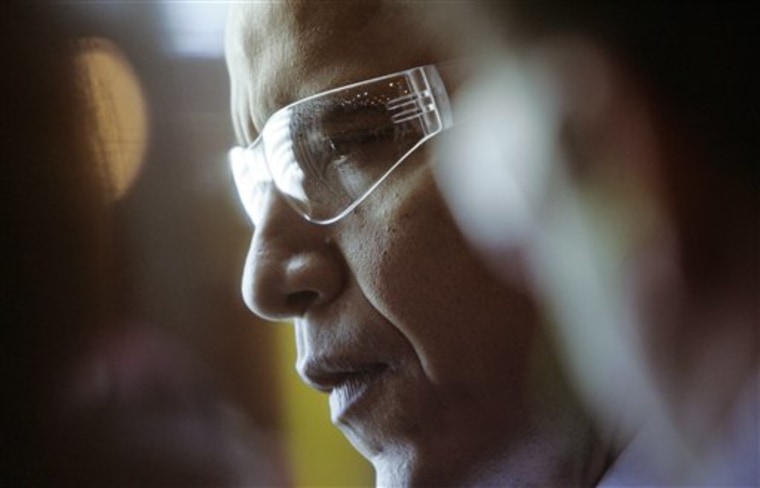Democrat Barack Obama, campaigning in a state that poses several problems for him in the fall, appealed to working-class voters Wednesday with a pledge to pump an extra $200 million a year into efforts to revitalize the nation's manufacturing sector.
One day after blue-collar workers overwhelmingly rejected him in West Virginia's presidential primary, Obama came to this auto-making suburb of Detroit to announce plans to create an "advanced manufacturing fund" to promote industries likely to keep jobs in the United States rather than see them move overseas.
He also stepped up his criticisms of Republican presidential candidate John McCain, saying the Arizona senator offered no solutions when he told Michigan voters in January that many of their lost jobs would not come back.
McCain "was right" about that, Obama said in remarks prepared for a midday speech. "But where he's wrong is in suggesting that there's nothing we can do to replace those jobs or create new ones."
He proposed spending $90 million a year to double the Manufacturing Extension Partnership. The program has helped manufacturers improve efficiency and growth, Obama said, but has been underfunded. Another $100 million annually would launch the advanced manufacturing fund, which would award grants to businesses working with researchers to develop and expand products and efficient practices.
The Illinois senator spoke to union workers and their families at Macomb County Community College in Warren, Mich., after touring a Chrysler plant in Sterling Heights. The region is rich in so-called Reagan Democrats, who have often abandoned the party when it nominates candidates they view as too socially liberal, but who also have rejected Republicans they see as insufficiently concerned about working-class families living from paycheck to paycheck.
Strategists see Michigan as a must-win state for Obama. Democratic presidential nominees have carried it in recent elections, but by narrow margins, and McCain has campaigned here several times.
A scheduling quarrel caused the national Democratic Party to essentially nullify Michigan's Jan. 15 primary, and Obama neither campaigned in the state nor had his name on the ballot. Now, within reach of securing the nomination despite Sen. Hillary Rodham Clinton's big win in West Virginia, Obama is trying to make up for lost time. He also hopes to soothe the anger and confusion that many Michigan Democrats feel over the intraparty fracas, which has yet to resolve how the state's delegates will be seated at the August Democratic convention.
In a bright spot for Obama, he picked up three more superdelegates after the West Virginia loss, offering fresh recognition from Democratic leaders of his inevitable nomination.
His campaign announced the support of Rep. Peter Visclosky of Indiana and Democrats Abroad chair Christine Schon Marques, who will get only a half vote at the national convention because the Democrats Abroad send double their allotted superdelegates and give them each a half vote.
A third superdelegate, College Democrats vice president and University of Wisconsin-Madison student Awais Khaleel, also announced Obama is his choice in video posted on YouTube.
Clinton also picked up a superdelegate, Tennessee Federation of Democratic Women Vicky Harwell, her campaign said.
An embattled Clinton is urging party leaders to take a hard look at West Virginia, which she won with 67 percent of the vote. But her victory did little if anything to knock Obama off stride as he approaches the 2,026 delegates needed to give him the presidential nomination.
Including delegates won in West Virginia and new superdelegates, Obama has 1886 delegates to Clinton's 1718.
